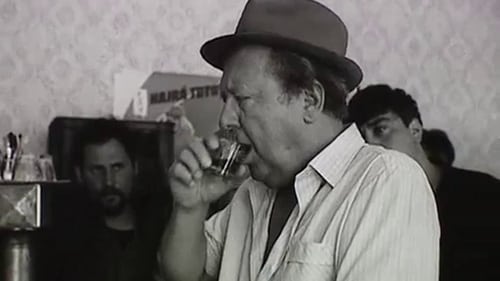
Óreg paraszt
In the small village of Rátót, every male is called Béla. When a woman gives birth to her child, she names him Józsi...

Czuczor
The heroes of the film are manual workers, members of a Socialist Brigade. Gyula, the brigade leader once has a dream where the gate-keeper searches through Lenin, about to leave the factory. He decides to stage Gelman's play, Premium, with his brigade, since the drama very effectively depicts what they see in the world around.

Tölgyesi's father-in-law
Frigyes, shortly after immigrating to New York City from Hungary, leaves his family for the pleasures and gratifications of being a street bum. But as time goes by, the appeal of this lifestyle wanes. A series of adventures with other drifters reaches a dramatic conclusion when some thugs murder one of them. This startling event forces Frigyes to come to terms with his current situation and decide whether to return to the family he abandoned.

Nagypapa

Marcell
From the intrigues and slander of the branch the painter Hódosi moves out to a hamlet at Hortobágy. He gets into conflict situation as well as he cannot endure that the political and economic elite of the neigbourhood would devastate the nature conservation area with hunting and (tax evading) goose husbandry.

Portoroki százados
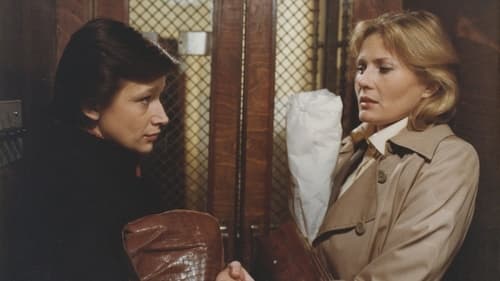
Major Blindics
Película que narra la historia de amor entre Eva, una periodista de firmes principios y abiertamente lesbiana, y Livia, una periodista casada con un oficial del ejército. Las dos trabajan en la misma oficina y poco a poco Livia empieza a sentir interés por las insinuaciones de Eva.
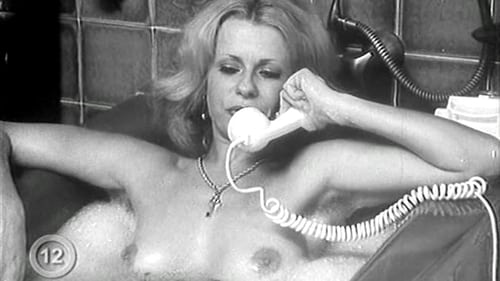
Kerekes kapitány
Lt. Kojak arrives in Budapest as a guest speaker for the 'International Crime Writers Conference'. Soon after he starts enjoying the pleasures that the city has to offer, he assists his old friends at the police department with a case. The case involves solving the murder of a noted scientist, unaware that a Mafia hit man and his female companion are targeting him.

I. Apafi Mihály fejedelem

This detective story about three women who humiliate men.

An adult educator arrives in the small-town factory with loads of books, energy and a freshly received diploma. The honest young man with dreamy eyes humanises the life of the plant, in a way distributing himself among people.

Harangozó

Kozma
The loving couple of this grotesque parable parody of the Kádár-regime, Mária and István row to an uninhabited, idyllic island. Soon crazy tent-pitchers swarm to the island, led by an official representative of the regime.

This film shows us around a factory in the seventies in Hungary. In the outskirts factory of Kőbánya workers celebrate the foundation members and want to present the oldest member, Uncle Benda, now a pensioner, with a golden ring. His grandson, Karcsi Merkovics, an industrial apprentice, is in love with the foreman's daughter.

Kasos úr
Marci, an impertinent crook buries his drunk parents and chooses to wander instead of becoming an apprentice.

The poor little Ferkó is trying to enrich his miserable life with imaginary fairy tale figures and superstitious little stories. He suffers from diphtheria, and while he is having a visionary dream, Cinkekirály (Titmouse King) saves him from the claws of the magic Küsmödi. He expects his magic jacket to enable him to know everything at school without having studied.

Feature film version of the 1971 series.

Miska
This is a romantic biographical film about Franz Liszt. In a distinguished saloon of Paris, the unknown composer, Liszt, defeats the renown Thalberg at a piano competition. Through his playing, he wins the favours and later the hand of the countess D'Agoult. A daughter is born in their marriage, Cosima. Liszt is better and better known, Marie introduces him to the circle of artists.

Feola bácsi
The film take place in Budapest, in the end of The World War II, telling the story of a young Communist who escaped from prison. The boy tries to revitalise his contact with the movement, but he is told to be quiet and wait.

Balogh
The protagonist of this farce is the enthusiastic, bald, spectacled Krebsz, an employee at the Prime and Sample Institute. He alerts the whole village to organise a beauty contest in the weed-field of Balatonszutykos. Hoping to win the grand prize, the leading role in a two-hour colour-film, the girls make all efforts and use all their tricks.

Lajos - üzletvezetõ
The grotesque comedy with crime elements takes place in a grocery store.

The members of a rifle-corps unit gather in a village by the western border

Zeke Máté
The 16th century Kecskemét troubled by both the Kurutses and the Labancs would like a Bey from the Buda pasha to defend them in exchange for four beautiful girls, but only gets a caftan. It was a good deal, however. All Muslims fall on their knees when they see the magic caftan and fulfil its owner's wish.
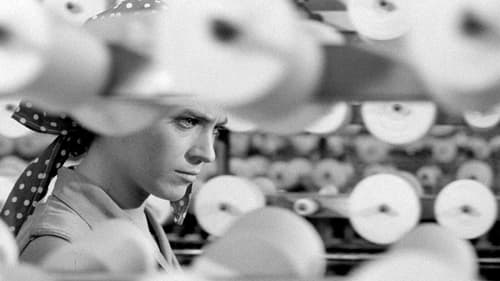
Zsámboki
A young woman leaves a state orphanage to find her mother in this interesting examination of how the overt repression of women in the older pattern of village life has been replaced by the more subtle exploitation inherent in the apparently freer existence of young girls in the contemporary city.
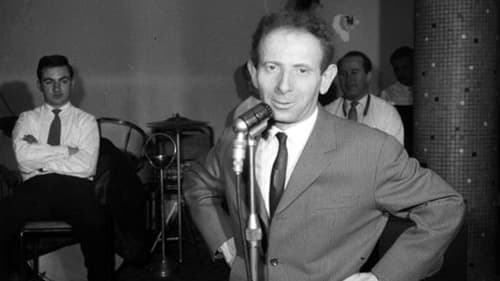
Igazgató
A comedy about two twin brothers - Sándor, who emigrated and became a rich man, and Zoltán, who stayed in Hungary and lives the life of an average working-class man. When Sándor visits his twin brother, they are constantly mistaken for each other, and when Zoltán sees how differently people treat Sándor because of his money and his foreign citizenship, he begins to like being mistaken for him - until he realizes that this means he will lose his girlfriend Szöszi...

Mrs. Holló reports the case of three missing persons to the police. During the investigations, the captain realises that there is nothing to deter Mrs. Holló from her trying to overcome loneliness.

Svajda
The family travels to Zebegény for their holiday, and the following day the seventeen-year-old Vera also leaves for Lake Balaton to pick peaches in a voluntary camp there. Her boyfriend, Gyuri, goes to a film shooting. Gyuri would like to make the best of the day in the absence of parents, but Vera refuses him. She becomes jealous at once, however, when she discovers Gyuri's previous girlfriend in the shooting team.

Szabó tizedes
Andras Kovacs' film, considered one of the most important Hungarian films of the 1960s, centers around four men who await trial for their involvement in the massacre of several thousand Jewish and Serbian people of Novi Sad in 1942. Each denies any responsibility, claiming that they were only following orders. The film is significant for its willingness to address the subject of Hungary's role in WWII, which was taboo at the time of the its release.

Ádám
For the first time after 11 years, Simon, a young historian visits the village of his childhood at Balaton and Aunt Lina, his foster-mother. He gets upset by what he experiences there: the old woman's troublesome and vexing everydays, her quiet sadness. He is overwhelmed by his own memories, the death of his foster-father and by everything he was not aware of before, or he simply wanted to forget.
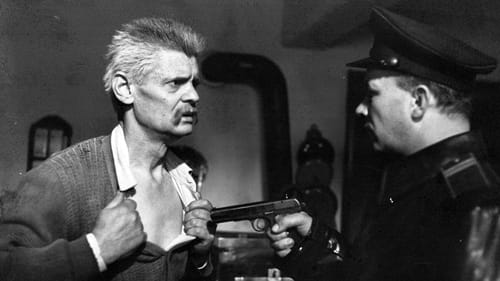
Béni Kocsis
A crusading newspaper reporter covers the Soviet invasion of Hungary in 1956. Initially critical of the communists, the feature later espouses the virtues of the social changes implemented since the invasion. The title refers to the period of time the reporter spent interviewing witnesses to the invasion.

The triumphant adventures of the Hungarian baron Münchausen are recounted in the form of a musical.

Joseph II, the enlightened Austro-Hungarian emperor, entrusts his loyal and confidential subject, Ráby Mátyás, formerly a treasurer, to examine the abuses made by the magistrates of Szentendre and Izbég. Following his old friend, Dacsó Marci's directions, Ráby reveals horrible robberies, tax evasions, frauds, and other illegal acts having been committed against the people.

A past world is revived in the little cottage in the outskirts, next to the housing blocks under construction. Tamburás, the old hobo collects swerved youth: Diák, who desires freedom, the bus driver who is deprived of his license for having run over someone, and the rest. They have got an easy and unbound life there, with constant music, small thefts, occasional labour, tricks.

Rubint János földgyalus
A country family unbounds by the death of the head of family and they set off for a miners' town under construction, just like their forefathers, "to take the land". As an outpost, the eldest daughter, Anna is sent, who has a stormy past.

Doktor
On the crowded train, the workers entertain each other by telling stories.
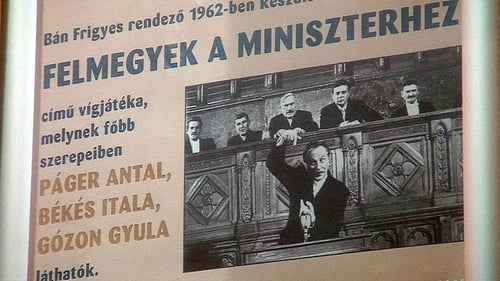
Miniszter
A comedy about the organisation of agricultural co-operatives. In the village of "Rendes", everybody has already entered the co-op, only the stubborn farmer, Bódog Balogh continues to resist. The leadership plays all their tricks and uses all their efforts, but all in vain.

Kecskés János, igazgató
Bene, tired of the professional battles of engineers and trying to escape a ship-wrecked marriage, asks to be transferred to the country. The gravest problem of the sandy region in Nagyalföld (Great Hungarian Plain) is the shortage of water. The tireless director of the local state farm asks for Bene's support, but the disillusioned man refuses him.

Samu Kaál
Merry soldiers arrive in the sleepy Transdanubian town. The cynical woman-hunter, Ferdinándy, learns to know doctor Barlay's beautiful wife at a carnival. She lives a happy married life, and the attentions of the lieutenant are all in vain.

Szombati Károly
Vetró János, the lorry driver, is an alcoholic. His marriage is in pieces, his wife has a lover. Their son suffers an accident. The next day his wife moves out. In his desperation, Vetró drinks even more, and leaves his work as well.

Schmidt
Csepel, 1945. The Csűrös family, in addition to their three children, give accommodation to the orphaned Jóska, although they themselves struggle with difficult circumstances. The boy lends a helping hand in the factory during the days.

captain Patkós

Dobi, corporal
On the eve of World War II, Major Benedek Zoltán is an embodiment of the service regulations in the army. He only discloses his feelings towards Anna, his brother's widow. An investigation is conducted in the regiment to identify Communists.

Ferenc Szabó

Jóska Nagy
The spring of 1919. Karikás Frigyes reorganises brigade 39 at the Tisza. His most devoted soldiers are Korbély János and his followers, who remain faithful to the political commissioner under all circumstances.

Sándor
Three people – a returned prisoner of war, his beautiful second wife, and the possessive, hunchbacked spinster who is his sister-in-law by his first marriage – are isolated in a little house under an extinct volcano, where each strives for personal happiness but is suffocated by their dependence on the others.

Major
Kölyök, this lovely, ham-handed young woman, has caused many a trouble already in the Dunaújváros Iron Works. Fortunately, however, the manager does not want to give her up, what is more, Kölyök found a second father even at the police.

János Gere
1932, Budapest. Gere János, an unemployed worker searching for employment in the capital, is organised into the secret police after a raid. Summary justice is declared, and the police wants to find an illegal communist press at any price. Gere, wandering about in the dark city, joins a man, helping him to carry his luggage. Slowly, Gere learns that his companion is a Communist and his task is to keep the press machine hidden from the police.

Miska
Panni, coming from a landless family of ten and Miska have loved each other for a long time. The pretty Panni, however, has another suitor as well: Komáromi, the big farmer. The two men fight from time to time, but then, during the time Miska is serving his military duty, Panni marries Komáromi to end the tremendous squalor of her family.

János Jakab
The poetic love story depicting everyday life from a micro-psychological aspect takes place in the 1910s. Sándor, editor of the local paper, serves as a foot soldier on Sundays, but spends weekdays playing billiard and courting women. One Sunday afternoon - in soldier's uniform - he meets Vilma, the beautiful maid, whose honesty and chastity turns the adventure to love.
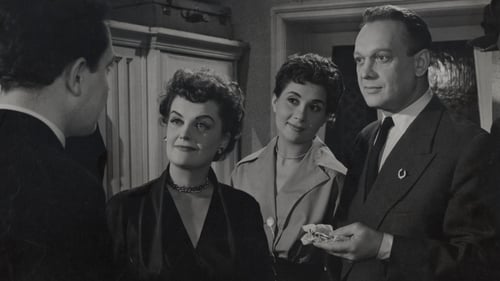
Varsa Imre
Varsa engineer receives the Kossuth award for his excellent work. His career once began at the family enterprise of his wife, so the woman invites her relatives for a dinner party.
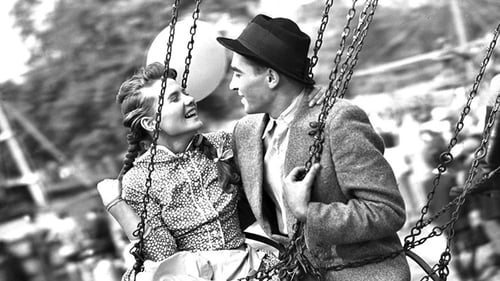
Farkas Sándor
In a rural scenery in the throes of difficult changes lives a humble but promising young farmer girl called Mari Pataki. Her father forbids her from seeing the man she loves. The father, above all preoccupied by work on the fields and prospective wealth, decides to give his daughter in marriage to an old but rich man with whom he does business. Land marries land, he says. This seems to be the unyielding rule of the Hungarian peasantry. But the young lover is ready to stand up to any challenge to keep Maris love.

Csikasz
György Dandin, the rich bourgeois concludes a marriage contract with the noblemen Lükeházy couple who has turned poor: he can marry their daughter in return of a regular financial contribution. Angyalka escapes the undesired husband at their very first night, and furthermore she establishes a secret romantic relationship with Count Klitander who suits her a lot better.

Pál Keszõce
Imre, secretary of the illegal communist party arrives in Budapest secretly in 1942, in order to start the newspaper of the party in the fight against war. Not even his own mother can see him.

Lajos Danka
Judge Csanádi András makes a confession to his boss one night: he fell in love with the pretty, modern driver woman, Zenthe Judit in a fencing room. The girl suddenly returned his feelings. One night she confessed to him crying: she hit someone. The case was assigned to Csanádi, who wanted to investigate the circumstances meticulously despite his feelings. Thus the so far hidden life of Judit, which is bound to the past former world and its values is now highlighted. He is confused, asks his boss to absolve him from the assignment, but refuses to do so. Csanádi realises in the court room: Judit kept on telling lies, she played the lover for her own interest. The judge passed his crisis, he will deliver a fair sentence.

Berci Majsa
The top management of the co-operative in the rural community at Lake Balaton goes on coaches everywhere to irritate Mrs. Peczöli, the snobbish wife of the only individual farmer. Peczöli would readily join the co-operative, should it not oppose his apple improving experiments.

István Simon
Venice Film Festival 1954

Orbán
Kiskrajcár is a 1953 Hungarian film directed by Márton Keleti. It was entered into the 1954 Cannes Film Festival.

Hajdu Gyurka, peasant
March 15, 1848; the revolution breaks out in the town of Pest. Yet at café Pilvax, in among he revolutionary youth, there is the informer of the imperial court as well. Hearing the news of the attack led by Jellasics, the inhabitants of the villages pour into the national army, and Hajdú Gyurka also escapes from his landlord. Petőfi is there at the camp of the revolutionaries, raising them to enthusiasm with his poetry.
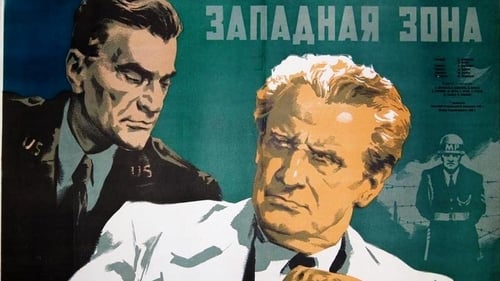
István Kádas

Jóska Varga
Kis Katalin and Varga Jóska are getting married. During their honeymoon they are preparing plans for the future. Katalin, however, seems to lag behind both in her studies and the work competition, becoming a couch potato version of a wife. Jóska, instead of trying to help, does nothing else than his work.

Jóska has become a Communist in the Csillag prison in Szeged. In the meantime, Gábor successfully talks people in Jóska's native village out of joining the German-led Hungarian army.

SZIT-titkár
A female worker in Socialist Hungary gains the acceptance of her male colleagues.

Joseph "Joska" Goz
In 1905 Hungary, a young village woman has just undergone a marriage to the spoiled son of a man to whom her father is indebted, in order that the debt be cancelled, only to be spirited away by her true love, a young peasant, by whom she soon becomes pregnant. Together they attempt to find a way to buy up her father's debt and also pay for a divorce from her husband, against various odds.















































